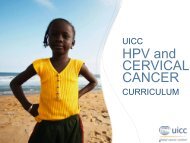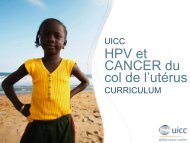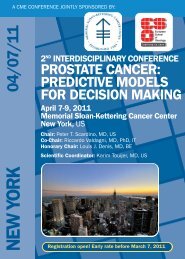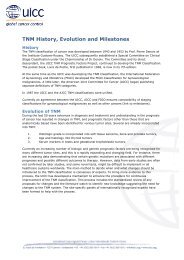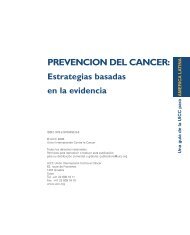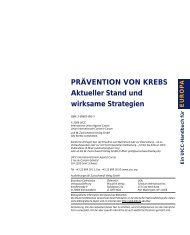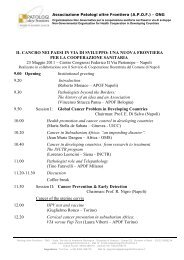Annual Report 05 - International Union Against Cancer
Annual Report 05 - International Union Against Cancer
Annual Report 05 - International Union Against Cancer
Create successful ePaper yourself
Turn your PDF publications into a flip-book with our unique Google optimized e-Paper software.
<strong>International</strong> cancer fellowships<br />
Each year, the UICC awards international<br />
cancer fellowships to help in<br />
the professional development of can-<br />
In 2008, UICC awarded 140 fellowships<br />
cer investigators, clinicians and nurses,<br />
and cancer society staff and volunteers,<br />
so that they can deliver appro-<br />
Connecting, mobilizing, supporting<br />
priate diagnosis, treatment and care<br />
wherever they live. Over 6,000 fellowships<br />
have been awarded to date.<br />
American <strong>Cancer</strong> Society international fellowships for beginning investigators (ACSBI) 5<br />
Yamagiwa-Yoshida Memorial international cancer study grants (YY) 12<br />
<strong>International</strong> <strong>Cancer</strong> Technology Transfer (ICRETT) fellowships 104<br />
<strong>International</strong> <strong>Cancer</strong> Technology Transfer (ICRETT) training workshops 10<br />
Trish Greene international cancer nursing training workshops (CNTW) 4<br />
Asia-Pacific <strong>Cancer</strong> Society training grants (APCASOT) 5<br />
Setting priorities in radiotherapy: technology and access<br />
India with its rising economic<br />
prosperity is a country in transition,<br />
although large sections of the population<br />
still await the health benefits of<br />
this boom. On the other hand, its<br />
sizeable technical workforce, its technological<br />
capability and a demanding<br />
middle-class create a push for a modern<br />
and technology-intensive<br />
approach to health care.<br />
The latest developments in imaging<br />
and increasing precision of delivery<br />
are now an integral part of radiotherapy<br />
in the developed world.<br />
Provision of universal access to such<br />
developments remains high on the<br />
agenda of all health systems, particularly<br />
publicly funded ones. In lowand<br />
middle-income countries the<br />
need to reconcile crucial technological<br />
advances with access to more<br />
basic cancer treatment is stark.<br />
In January 2008, the UICC organized<br />
an ICRETT workshop in<br />
Chennai on setting priorities in<br />
radiotherapy, in partnership with the<br />
Association of Radiation Oncologists<br />
of India (AROI). Delegates were<br />
senior radiation oncologists, radiation<br />
physicists, heads of cancer centres,<br />
and senior oncologists from India’s<br />
corporate health-care sector. The<br />
workshop discussed the frontline role<br />
of radiotherapy in cancer treatment<br />
in both the global and Indian settings,<br />
along with the need for a minimum<br />
acceptable standard of care.<br />
An overview was given on the<br />
“great leap forward” from 2D to 3D<br />
radiotherapy and its modernizing<br />
implications for cancer treatment.<br />
ICRETT fellow Marciano Anghinoni, Brazil<br />
ICRETT fellow Chioma Asuzu, Nigeria<br />
Total 140<br />
31<br />
Offering strong support



